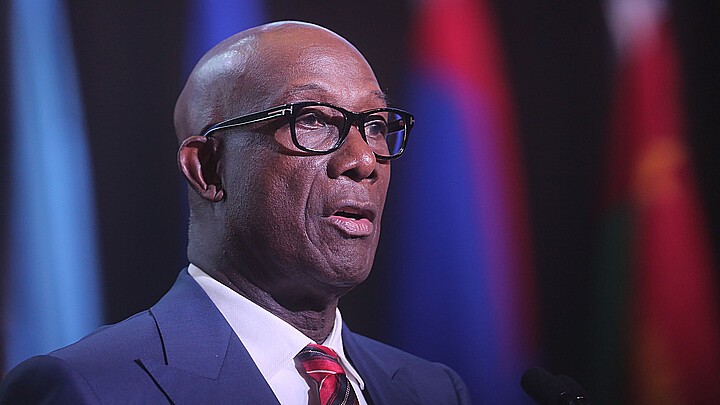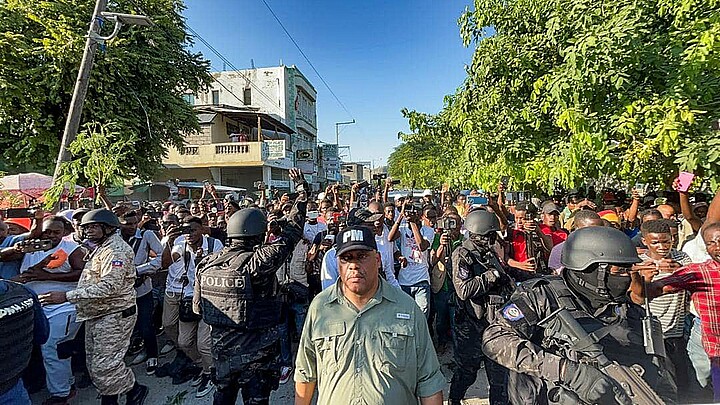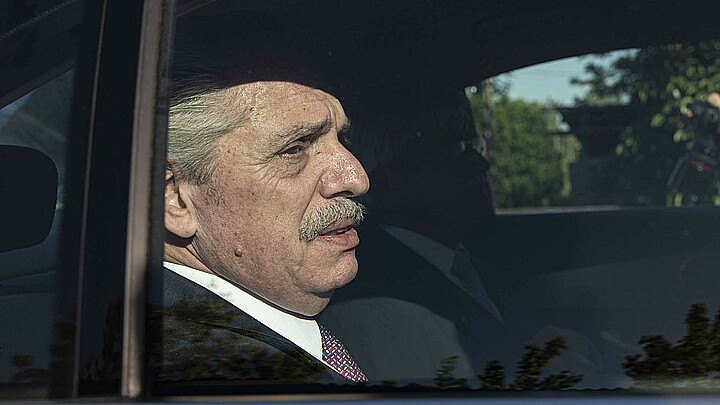Crime
Police rescue hostages after armed, hooded gunmen seize Ecuadorian television station amid gang wave of terror
Ecuadorian news stations have reported that at least 10 people have been killed in the past 48 hours since a 60-day state of emergency was implemented in the South American country on Monday

January 10, 2024 8:24am
Updated: January 10, 2024 10:48am
A group of armed, hooded gunmen seized control of a live television station in Ecuador on Tuesday, threatening staff and forcing them to lie on the floor during a live public television Channel TC broadcast.
The incident occurred in the city of Guayaquil shortly before the live feed cut out. Ecuadorian law enforcement agents said they rescued all the staff members and ultimately arrested 13 individuals who were armed with weapons.
When the seizure of the news station first happened, the incident was filmed live, and viewers were able to watch the armed gunmen order the TV station workers to lie on the floor while demanding police leave the surrounding area.
One of the journalists taken captive during the ordeal collaborates with ADN America, but for safety reasons, and at the request of the individual’s family, ADN is not disclosing his identity or any personal details.
He has since been returned safely to his family since police secured the TV station.
Newly elected President Daniel Noboa has since declared war on the gangs, addressing his countrymen on Tuesday, insisting that an “internal armed conflict” is erupting across the country and that his government is mobilizing soldiers to carry out “military operations to neutralize” what he referred to as "transnational organized crime, terrorist organizations and belligerent non-state actors.”
U.S. officials, who are currently using the FBI to coordinate transnational criminal investigations in the South American country have condemned the “brazen attacks” and said it is “coordinating closely” with newly elected President Daniel Noboa.
The U.S. added in a statement that it is “ready to provide assistance” to Noboa’s Ecuadorian government.
Ecuadorian news stations have reported that at least 10 people have been killed in the past 48 hours since a 60-day state of emergency was implemented in the South American country on Monday.
Noboa recently signed a recent decree acknowledging the country’s “internal armed conflict” and ordered the nation’s armed forces “under international humanitarian law and respecting human rights.”
At prisons throughout the country, some correctional officers have also been taken hostage in the wake of gang leader Adolfo Macías Villamar escaping his cell Sunday evening at the maximum-security wing of a jail in Guayaquil, where he has spent the past 12 years.
Villamar, who is commonly known throughout the South American country as “Fito,” is the Los Choneros from prison after Jorge Luis Zambrano was killed in December 2020. The gang is connected to Mexico's powerful Sinaloa cartel, is named after its power base in the town of Chone and is widely known for drug trafficking and extortion.
Shortly after his escape, hundreds of law enforcement agents and military personnel were mobilized as part of a massive manhunt in what now appears to be one part of a larger plan organized by criminal gangs against the new president.
Noboa, was elected in October with a promise to combat violent crime after criminal gangs assassinated another presidential candidate, Fernando Villavicencio, an investigative journalist and anti-crime crusader who was killed by masked gunmen during an August 9 political rally.
Shortly after the tragic killing, the Ecuadorian government announced a transnational joint murder investigation with the United States and offered a $5 million reward.
Noboa’s election in December brought cheers across the country as the young businessman took office, but Monday’s acts of terror have prompted the newly sworn in president to decree a two-month state of emergency as the government pledges to regain control of the country's prisons.
Since 2021, Ecuador’s correctional institutions have been the scene of violent clashes between drug trafficking gangs that have left more than 420 inmates dead.
“Given this, these supposed narco-terrorist groups try to threaten us and believe that we will give in to their demands,” Noboa declared in a message on social networks.
Despite the state of emergency, three police officers were kidnapped in the southern city of Machala, another disappeared in the capital, Quito, and dozens of correctional officers are currently suspected of having been taken hostage in prisons across the country on Tuesday.
Videos shared on social media have shown which prisons were affected and where officers may have been taken hostage by masked gang members, armed with guns and knives, who have used the kidnappings and media attention to recite threatening statements to the new president.
The missing gang leader, Macías, 44, vanished from prison on Sunday after a transfer from one security facility in Guayaquil to another.
While Macías Villamar has spent the past dozen years behind bars, he was transferred in August to a smaller jail known as La Roca in the same complex.
He was transferred back to La Regional after Macías Villamar lawyers argued the wing did not provide an adequate level of safety for the notoriously known gang leader.
If Macías Villamar made it out of the actual Guayaquil prison complex, it would not be his first time.
In 2013, he broke out of La Roca with 17 other inmates and escaped in boats on the river Daule, only to be quickly apprehended along with his brother four months later at their mother's home in the city of Manta.
The incident also occurred after the gang leader’s daughter, known throughout the country as Queen Michelle smuggled a mobile phone device into the prison to film her father behind bars, a violation of regulations.
The video, which was designed to show a more friendly side of the notorious gangster depicted Villamar chatting with other prison inmates and fighting a rooster in a cockfight style scenario.
Guayaquil is one of the port cities among others that has recently had a surge of violence as a result of drug cartels and gangs trying to secure the areas to effectuate their importing and exporting of illegal cocaine products.
Some port cities have seen their have seen homicide rates increase five-fold in the last five years. Six months before Fernando Villavicencio’s August 9 assassination in February 2023, Omar Menéndez, the mayor of another port town was assassinated after gunmen burst into his campaign headquarters and began firing.
Despite serving a 34-year sentence since 2011, Villamar has remained a powerful figure behind bars.
About 24 hours after Villamar is believed to have escaped from his security facility in Guayaquil, another gang leader, Fabricio Colón, escaped from Riobamba prison during riots on Monday night, the prison service confirmed.
Ecuadorian prosecutors also suspect Colón, leader of the Los Lobos gang, is also involved in Villavicencio’s assassination, and he has been linked to death threats against Attorney General Diana Salazar.
Since his presidential campaign, Noboa has made clear he will not negotiate with “terrorists.” He has attributed the recent surge in prison violence to a panicked reaction to his plan to transfer gang leaders to a new high-security prison.
Noboa also plans to hold a referendum to earn a mandate to bolster crime-fighting measures to increase prison sentences and seize assets from suspected criminal enterprises.











